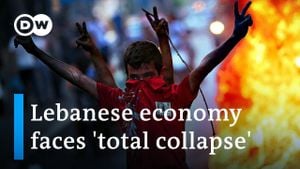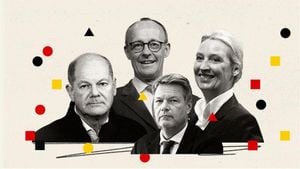Olympique de Marseille's recent 3-0 defeat to Auxerre sparked significant controversy across the French football scene, primarily due to the harsh criticism directed at Ligue 1 by the team's president, Pablo Longoria. This defeat not only jeopardized Marseille's attempts to challenge Paris Saint-Germain for the top spot but also ignited discussions about the integrity of officiated matches within the league.
During the game held at the l’Abbé Deschamps stadium, referee Jérémy Stinat made several contentious decisions, one of which included the expulsion of Marseille's Derek Cornelius. The situation escalated to the point where Longoria stormed out of the VIP box, visibly upset by what he perceived to be blatant officiated injustices. "En mis 20 años de carrera, nunca había visto este tipo de cosas. Está todo organizado desde la amarilla de Balerdi (en Angers). Es una auténtica corrupción," Longoria stated, echoing his long-standing frustrations with the refereeing standards. His discontent culminated with charged comments to the media, calling Ligue 1 "un campeonato de mierda" and expressing his willingness to leave for the Super League should the opportunity arise.
This explosive claim reverberated throughout sporting and institutional circles, sending shockwaves across the football community. Young and ambitious, Longoria’s candid remarks highlight not only the competitive distress Marseille faces but also the mounting frustration clubs experience under what they perceive as compromised officiation.
Longoria's approach does not come without precedence. Previously, the sporting director of Marseille, Mehdi Benatia, received sanctions for critiquing NFL officials, indicating the heightened sensitivity and potential ramifications when criticizing the game's officials. The tension surrounding officiation has been made clear, as the morale of players and officials alike is put under strain due to repeated allegations of bias.
Not long after Longoria's remarks, Olivier Lamarre, spokesperson for the French Referees Union (SAFE), responded with equal force, expressing their outrage at Longoria’s comments. "No podemos aceptar estas acusaciones. Hemos decidido remitir el asunto al Comité Nacional de Ética y presentar denuncias por difamación,” Lamarre stated, attempting to defuse the situation by firmly declaring their commitment to integrity within the refereeing ranks. This back-and-forth introduces questions about accountability and the ethics of officiation on the pitch.
Longoria's inflammatory statements also come at a precarious time for Ligue 1. Financial instability looms as rumors of Qatar’s exit from Paris Saint-Germain and payment issues with DAZN have lent instability to the league. Amidst fierce competition and uncertain landscapes, Marseille's administration must navigate their way through both on-field performance and off-field politics, emphasizing how deeply interlinked these elements are.
Adding to the tension, coaches and legends associated with the club also echoed Longoria's sentiments. Roberto De Zerbi, the current coach, highlighted during the fallout: "El árbitro influyó en el partido. No estaba tranquilo y hubo un claro penalti sobre Quentin Merlin," criticizing how officiation impacted the game flow and player morale. Fabrizio Ravanelli, meanwhile, lamented the state of officiation, remarking, "Ha sido vergonzoso. En 40 años nunca he visto nada igual; es inaceptable para el fútbol francés."
The narrative surrounding Marseille doesn’t only reflect their struggles but presents broader questions about the integrity and sustainability of Ligue 1 as it begins to experience turmoil from all angles. The prospect of Marseille considering aligning with the Super League, already supported by entities like Real Madrid and FC Barcelona, intensifies the scrutiny on Ligue 1. If Marseille were to pursue this option, it may signal both discontent with current operations and fundamental shifts within European football governance.
With the union of referees promising actions following Longoria’s accusations and the rising tension within Ligue 1, the future remains uncertain. This episode serves as both symptom and catalyst of larger issues within French football, compelling clubs to reassess where their loyalties lie and how best to advocate for their interests amid eroding trust and accountability.



